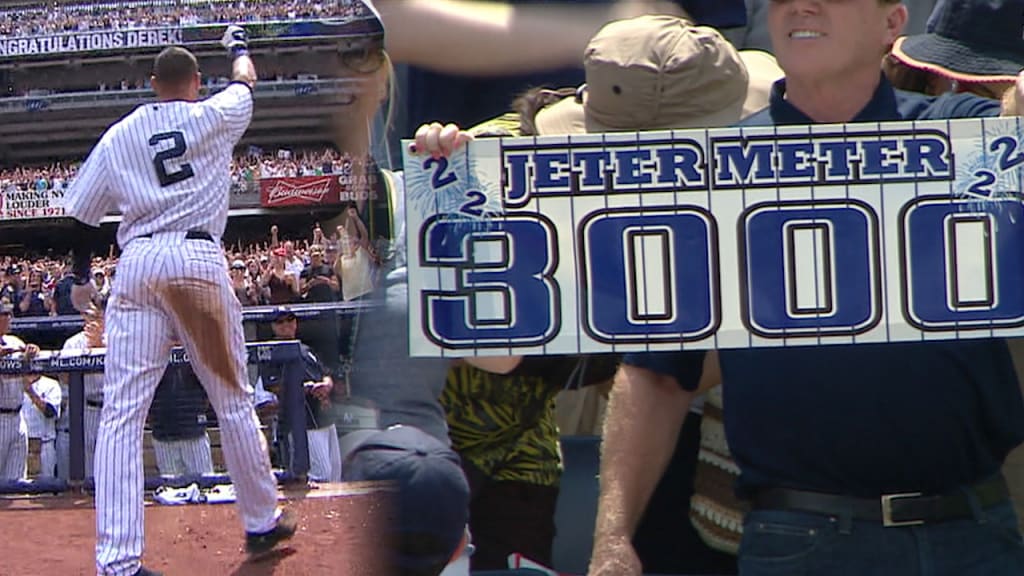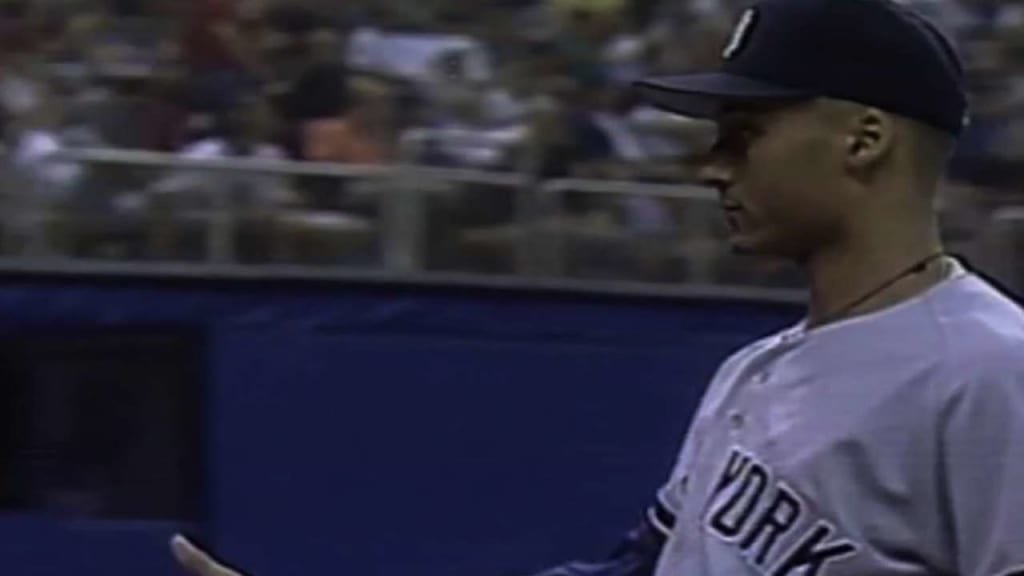Jeter didn’t stick when he first arrived
This browser does not support the video element.
Bill Evers remembers the conversation like it was yesterday. After all, it's not every day you get to tell a future Hall of Famer he's getting the call to the Majors.
A quarter century ago, Evers was the manager of the Columbus Clippers, who at the time were the Yankees' Triple-A affiliate. He had been notified by the club's brass in New York that Derek Jeter -- the team's top prospect -- was being promoted to the big leagues, where he would fill in for Tony Fernandez, the Yankees' injured shortstop.
"I made him aware that he was going up there for the time that Tony was hurt, and when Tony was able to come back, he was going to come back to me," said Evers, who now serves as the Twins' catching instructor on the Major League coaching staff. "He was excited to go there for the first time and be the guy."
The Yankees were suffering from a rash of injuries -- sound familiar? -- that included disabled list stints for Fernandez and second baseman Pat Kelly. Jeter, who had been tabbed by Baseball America as the Minor League Player of the Year in 1994, had initially been passed over in favor of Robert Eenhoorn, a 27-year-old infielder who had gotten his first cup of coffee in the Majors the previous season.
Eenhoorn went 0-for-7 in his first three games, prompting general manager Gene Michael to summon Jeter for the team's May 29, 1995, series opener at the Kingdome in Seattle.
"I was always criticized for not sticking with our young players," George Steinbrenner told the New York Post only days before Jeter was called up. "I was always accused of giving up our young talent. We've got some fine young talent. Now we'll find out about them."
Evers went to Jeter's hotel room to deliver the news.
"I told him, 'The simple fact is that you're getting the opportunity, so make the most of it. Come September, if they need you, you'll be ready to go back up there. After that, hopefully things work out and you can be the guy.' He was going up there and prove to them that they were making the right choice."
Manager Buck Showalter penciled in Jeter at shortstop, inserting him into the No. 9 spot in the lineup.
This browser does not support the video element.
"I was trying to figure out how he was going to help us," Showalter said in 2014. "I knew he would run and steal a base, and we felt like he could catch the ball. I mean, this was two years removed from making 60 errors in Greensboro."
Among those also in the Yankees' lineup that evening were Wade Boggs, Paul O'Neill and Don Mattingly, while Bernie Williams -- who was still two years away from becoming an All-Star -- hit in front of Jeter in the No. 8 spot.
Jeter recorded a flyout, a groundout and a lineout in his first three at-bats against starter Rafael Carmona, then grounded out against future teammate Jeff Nelson in the ninth inning of a 7-7 game.
"Anyone I faced for the first time, they had never seen my slider," Nelson said. "I'm sure that's all he saw."
With the game still tied in the 11th inning, Jeter stepped to the plate with Gerald Williams standing on third base representing the go-ahead run. Jeter went down swinging against Dave Fleming, the first of his 1,840 career strikeouts.
The Yankees lost, 8-7, in 12 innings, as Jeter finished his debut 0-for-5. After the game, Jeter met up with his father, Charles, who had flown to Seattle for his son's debut. The two searched for a place to eat, settling on McDonald's.
This browser does not support the video element.
"It was the only place that was open," Jeter told The New York Times in 2009. "I treated."
Jeter started again the next night, getting the first hit of his career after an 0-for-6 start. He finished the game -- another Yankees loss -- 2-for-3 with a walk, then collected another hit in the final game of the series. The Yankees were swept by the Mariners, who would be a bigger thorn in New York's side later that year as Seattle won a memorable five-game American League Division Series.
Jeter didn't experience his first win until June 4, when the Yankees snapped a five-game losing streak with a victory against the Angels at Yankee Stadium.
Although his performance didn't suggest the start of a Hall of Fame career, Showalter saw enough to believe that Jeter had the right mindset and approach to succeed.
"The big thing everybody felt comfortable with is that he was going to be as good as he was capable of being," Showalter said. "That's a great accolade to pay somebody, because that's what keeps managers, coaches and front offices up; 'I wonder if he'll ever reach his potential.' Then the sky is the limit."
Fernandez returned from his rib cage injury on June 8, starting four games at second base, sparking speculation that the Yankees were considering making that a permanent move in order to keep Jeter at shortstop.
Jeter started 13 straight games, batting .234 with three doubles, a triple and six RBIs, collecting as many hits (11) as strikeouts (11) in 47 at-bats.
On June 11, following a win over the Mariners to close out a 3-7 homestand, the Yankees were preparing to fly to Detroit to open a four-game series against the Tigers. Jeter, who grew up in Kalamazoo, Mich. -- about 140 miles from Tiger Stadium -- was eager to play in front of friends and family.
Not so fast. Jeter would have to wait nearly 12 months to experience that thrill.
The Yankees sent Jeter back to Triple-A after the game along with Mariano Rivera, who had allowed five runs in 2 1/3 innings that day. Detroit would have to wait.
"I think I was guilty by association," Jeter said in 2014. "They sent us down. Our bags were packed and we were going to Detroit, so there was a lot of friends and family that had to change their plans."
This browser does not support the video element.
Before leaving the ballpark, Mattingly stopped by Jeter's locker and told the 20-year-old, "You'll be back."
While the Yankees headed to the airport, Jeter and Rivera went to a Bennigan's restaurant near their New Jersey hotel to lick their wounds over a burger.
"Man, me and Mo were so depressed," Jeter told the New York Post in 2010. "It was terrible. You never want to be sent down, especially when you're somewhere you think you can play."
"We were devastated; we were almost in tears," Rivera said last year on MLB.com's Full Account podcast. "The feeling we were feeling that day, we didn't want to feel that again ever. That moment was difficult; it was hard, it was tough. We had never been sent down from nowhere; Minor Leagues, we always went up. Both together the same day; if you ask him, he would tell you it's my fault because I didn't do my job. It was something we both had to go through to understand the abilities and the capacity that we had to get better."
Jeter and Rivera returned to Columbus with a renewed sense of purpose. They had tasted big league life and wanted to do so again; only next time they got that opportunity, it would be for good.
"What I noticed was that made them more determined to get back there," Evers said. "Sometimes when guys come back to Triple-A, they feel like, 'I'll get the call again.' I didn't feel that with them. They felt like they proved that they belonged, and they were going to continue to work hard so when they got the opportunity again, they would go back up there and be the guys.
This browser does not support the video element.
"I talked to them both about the experience and they said, 'When we go back up there, we're going to make an impact.' I always told guys when they got the call from Triple-A to the big leagues, 'Don't be happy about being there; go up there and make an impact so you can have some longevity in the big leagues.'"
Rivera returned to the Majors in July, but Jeter wasn't promoted again until September, when he was a late-season callup. He appeared in just two games, and although he wasn't on the Yankees' postseason roster, Showalter kept Jeter with the team in October to give him a taste of the playoff atmosphere.
Showalter was replaced by Joe Torre after the 1995 season, while Jeter went on to seize the starting shortstop job in the spring of '96 after Fernandez suffered a season-ending injury.
Looking back, did Showalter think the skinny 20-year-old he put into the lineup that night in Seattle would go on to author a legendary Hall of Fame career?
"Nobody is that smart," Showalter said. "To think what's going to happen 19 years in a row? Come on, man. It doesn't surprise me looking back on it because of who he is."

